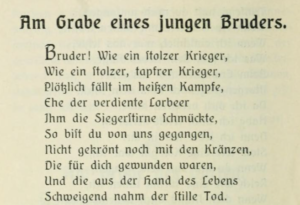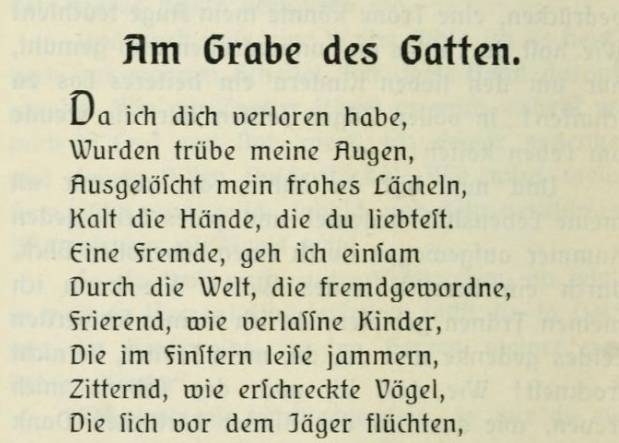| Source (German) | Translation (English) |
|---|---|
Am Grabe eines jungen Bruders. |
At the grave of one’s younger brother. |
Bruder! Wie ein stolzer Krieger, Wie ein stolzer, tapfrer Krieger, Plötzlich fällt im heißen Kampfe, Ehe der verdiente Lorbeer Ihm die Siegerstirne schmückte, So bist du von uns gegangen, Nicht gekrönt noch mit den Kränzen, Die für dich gewunden waren, Und die aus der Hand des Lebens Schweigend nahm der stille Tod. |
Brother! Like a proud warrior, Like a proud, brave warrior, Suddenly falls in hot battle, Before the laurel he deserves Adorned his victor’s brow, That’s how you left us, Uncrowned with the wreaths That were prepared for you, And which from the hand of life Silent death stealthily took. |
Du warst jung, und deine Jugend Schlug die Schlachten deines Lebens Mit dem frohen Mut des Kindes. Stark und hell war deine Seele, Treu und schweigsam deine Liebe, Wie ein Baum des Waldes warst du, Der ein Stolz ist den Genossen, Und an dessen kühle Rinde Der vom Weg bestaubte Wandrer Gerne lehnt das heiße Haupt. |
You were young, and your youth Fought the battles of your life With the joyful courage of a child. Strong and bright was your soul, Faithful and silent was your love, Like a tree of the forest you were, The pride of its companions, And on whose cool bark The road-weary wanderer Gladly leans their sweltering head. |
Du warst jung, und deine Jugend Schien kein Mißgeschick zu kennen. Wer in deiner Nähe lebte, Wurde froh an deiner Freude, Wurde stark an deiner Stärke, Lernte Mut von deinem Mut, Unverwundbar schienst du allen, Als ob dich ein Zauber schüße, Ein geheimnisvoller Zauber, Doch der Zauber war dein Herz. |
You were young, and your youth Seemed to know no misfortune. Those who lived close by you, Became glad in your joy, Became strong in your strength, Learned courage from your courage, You seemed invulnerable to all, As if by some magic you were protected, A mysterious magic, But the magic was your heart. |
Du warst jung, Triumphgesänge Schien das Leben dir zu dichten, Da erklang das Lied des Todes Und berauschte deine Seele, Daß sie müde unseres Treibens Sich zur ew’gen Heimat wandte, Und uns einsam ließ zurück. Was uns blieb, ist ein Erinnern, Ein Erinnern, das zur Klage Hier an deinem Grabe wird. |
You were young, triumphant songs Life seemed to compose for you, Then the song of death sounded And intoxicated your soul, So that, tired of our labors To the eternal home it turned, And left us lonely. What we have left is a memory, A memory that becomes a lament Here at your grave. |
“Am Grabe eines jungen Bruders” by Lisa Tarlau can be found in Rabbi Max Grunwald’s anthology of Jewish women’s prayer, Beruria: Gebet- und Andachtsbuch für jüdische Frauen und Mädchen (1907), pages 546-547.
The transcription of the German provided machine-readable text for machine translations by DeepL, which we then edited for accuracy and clarity. We welcome any/all corrections, improvements, and additional transcriptions and translations of this work’s contents. –Aharon Varady
Source(s)


“Am Grabe eines jungen Bruders | At the grave of one’s younger brother, a teḥinah by Lise Tarlau (1907)” is shared through the Open Siddur Project with a Creative Commons Attribution-ShareAlike 4.0 International copyleft license.










Leave a Reply